Global Warming and the Free State
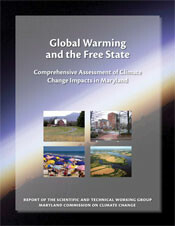 Global Warming and the Free State, which is Chapter 2 of the just released Maryland Commission on Climate Change's Climate Action Plan, has been printed as a stand-alone report. It is an assessment of the likely consequences of the changing global climate for Maryland's agricultural industry, forestry and fishery resources, freshwater supply, aquatic and terrestrial ecosystems, and human health. IAN staff worked with Don Boesch, President of the University of Maryland Center for Environmental Science, to produce this chapter, along with the Scientific and Technical Working Group of the Maryland Commission on Climate Change.
Global Warming and the Free State, which is Chapter 2 of the just released Maryland Commission on Climate Change's Climate Action Plan, has been printed as a stand-alone report. It is an assessment of the likely consequences of the changing global climate for Maryland's agricultural industry, forestry and fishery resources, freshwater supply, aquatic and terrestrial ecosystems, and human health. IAN staff worked with Don Boesch, President of the University of Maryland Center for Environmental Science, to produce this chapter, along with the Scientific and Technical Working Group of the Maryland Commission on Climate Change.
Reducing Maryland's Vulnerability to Climate Change
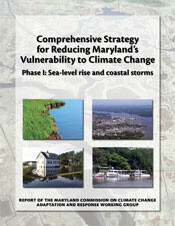 Comprehensive Strategy for Reducing Maryland's Vulnerability to Climate Change, which is Chapter 5 of the just released Maryland Commission on Climate Change's Climate Action Plan, is being printed as a stand-alone report. It makes recommendations to state lawmakers and policy makers to mitigate these impacts by taking action and committing resources to protect Maryland's future economic well-being, environmental heritage, and public safety from sea-level rise and climate change. IAN staff worked with Zoe Johnson, Program Manager with the Maryland Department of Natural Resources, to produce this chapter on behalf of the Maryland Commission on Climate Change, Adaptation and Response Working Group, chaired by MD DNR Secretary John Griffin.
Comprehensive Strategy for Reducing Maryland's Vulnerability to Climate Change, which is Chapter 5 of the just released Maryland Commission on Climate Change's Climate Action Plan, is being printed as a stand-alone report. It makes recommendations to state lawmakers and policy makers to mitigate these impacts by taking action and committing resources to protect Maryland's future economic well-being, environmental heritage, and public safety from sea-level rise and climate change. IAN staff worked with Zoe Johnson, Program Manager with the Maryland Department of Natural Resources, to produce this chapter on behalf of the Maryland Commission on Climate Change, Adaptation and Response Working Group, chaired by MD DNR Secretary John Griffin.
Maryland at Risk: Sea-level rise adaptation and response
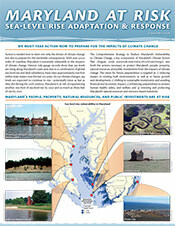 Action is needed now to stem not only the drivers of climate change but also to prepare for the inevitable consequences. With over 3,000 miles of coastline, Maryland is extremely vulnerable to the impacts of climate change. Historic tide-gauge records reveal that sea levels along Maryland's extensive coastline have risen approximately one foot over the past one hundred years. This relative sea level rise is due to a combination of global sea-level rise and localized land subsidence. As our climate changes, sea levels are expected to continue to rise and the rate of sea level rise is expected to increase, potentially twice as fast in the 21st century as the 20th century. Thus, sea level rise in Maryland could be another one foot by 2050 and as much as three feet by 2100. Low lying regions in Maryland will be placed further at risk due to innudation and flooding.
Action is needed now to stem not only the drivers of climate change but also to prepare for the inevitable consequences. With over 3,000 miles of coastline, Maryland is extremely vulnerable to the impacts of climate change. Historic tide-gauge records reveal that sea levels along Maryland's extensive coastline have risen approximately one foot over the past one hundred years. This relative sea level rise is due to a combination of global sea-level rise and localized land subsidence. As our climate changes, sea levels are expected to continue to rise and the rate of sea level rise is expected to increase, potentially twice as fast in the 21st century as the 20th century. Thus, sea level rise in Maryland could be another one foot by 2050 and as much as three feet by 2100. Low lying regions in Maryland will be placed further at risk due to innudation and flooding.
Global Warming is Here poster
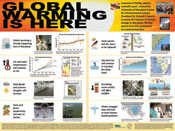 In 2007, Governor O'Malley asked a scientific team, chaired by University of Maryland Center for Environmental Science (UMCES) President Donald F. Boesch, to assess the impacts of climate change in Maryland. The results of that assessment were published in an August 2008 report entitled Global Warming and the Free State. Comprehensive Assessment of Climate Change Impacts in Maryland. IAN staff produced this poster summarizing the key points from the report. The poster is being displayed at a Horn Point Laboratory faculty climate change exhibit at the Lab Open House on October 11, 2008.
In 2007, Governor O'Malley asked a scientific team, chaired by University of Maryland Center for Environmental Science (UMCES) President Donald F. Boesch, to assess the impacts of climate change in Maryland. The results of that assessment were published in an August 2008 report entitled Global Warming and the Free State. Comprehensive Assessment of Climate Change Impacts in Maryland. IAN staff produced this poster summarizing the key points from the report. The poster is being displayed at a Horn Point Laboratory faculty climate change exhibit at the Lab Open House on October 11, 2008.
IAN welcomes back Kate Boicourt
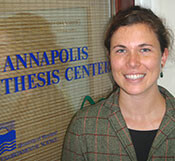 Kate Boicourt was a summer intern with IAN in 2006, after which she completed a Masters in Environmental Science (MESc.) at the Yale School of Forestry & Environmental Studies. She is now working with UMCES President Don Boesch and Zoe Johnson of DNR on Phase II of the Maryland Commission on Climate Change Adaptation & Response and the Scientific & Technical Working Groups – gathering expertise around adaptation beyond the coastal vulnerability issue to identify and synthesize information into recommendations addressing agriculture, transportation & planning, water resources, human health, forestry, and aquatic/terrestrial ecosystems.
Kate Boicourt was a summer intern with IAN in 2006, after which she completed a Masters in Environmental Science (MESc.) at the Yale School of Forestry & Environmental Studies. She is now working with UMCES President Don Boesch and Zoe Johnson of DNR on Phase II of the Maryland Commission on Climate Change Adaptation & Response and the Scientific & Technical Working Groups – gathering expertise around adaptation beyond the coastal vulnerability issue to identify and synthesize information into recommendations addressing agriculture, transportation & planning, water resources, human health, forestry, and aquatic/terrestrial ecosystems.
IAN hosts climate change workshops
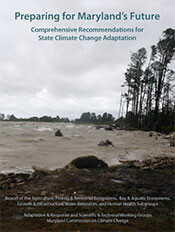 Maryland is a national leader in planning for climate change, and IAN is helping the adaptation planning effort. The Adaptation & Response and Scientific & Technical Working Groups of the Maryland Commission on Climate Change have been charged with taking state adaptation planning beyond coastal vulnerability (addressed in the Climate Action Plan in 2008). Kate Boicourt (UMCES) and Zoe Johnson (DNR) have been looking at impacts, strategy, and information gaps by establishing six sector-based subgroups: agriculture, water resources, bay & aquatic ecosystems, forests & terrestrial ecosystems, human health, and growth & infrastructure. Bill Dennison and Dave Nemazie have facilitated the first meetings. Common themes have been maintaining connections between sectors, managing for flexibility in the face of uncertainty, invasive species and pests, and concern about the capacity of current and future infrastructure to handle rapid change. Groups will meet again in the new year to hone the first comprehensive adaptation recommendations.
Maryland is a national leader in planning for climate change, and IAN is helping the adaptation planning effort. The Adaptation & Response and Scientific & Technical Working Groups of the Maryland Commission on Climate Change have been charged with taking state adaptation planning beyond coastal vulnerability (addressed in the Climate Action Plan in 2008). Kate Boicourt (UMCES) and Zoe Johnson (DNR) have been looking at impacts, strategy, and information gaps by establishing six sector-based subgroups: agriculture, water resources, bay & aquatic ecosystems, forests & terrestrial ecosystems, human health, and growth & infrastructure. Bill Dennison and Dave Nemazie have facilitated the first meetings. Common themes have been maintaining connections between sectors, managing for flexibility in the face of uncertainty, invasive species and pests, and concern about the capacity of current and future infrastructure to handle rapid change. Groups will meet again in the new year to hone the first comprehensive adaptation recommendations.
MD Commission on Climate Change adaptation report
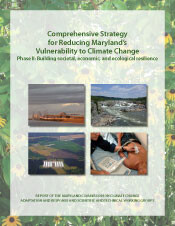 The Maryland Commission on Climate Change released its report "Comprehensive Strategy for Reducing Maryland's Vulnerability to Climate Change, Phase II: Building societal, economic, and ecological resilience" on January 24, 2011. The report details the findings of the Scientific and Technical Working Group, comprised of experts representing six sectors—human health, agriculture, forests and terrestrial ecosystems, bay and aquatic ecosystems, water resources, and population growth and infrastructure. Each sector assessed climate change vulnerabilities, and recommended adaptation strategies for the State of Maryland. The Phase II report follows "Phase I: Sea-level rise and coastal storms," and "Global Warming and the Free State: Comprehensive Assessment of Climate Change Impacts in Maryland."
The Maryland Commission on Climate Change released its report "Comprehensive Strategy for Reducing Maryland's Vulnerability to Climate Change, Phase II: Building societal, economic, and ecological resilience" on January 24, 2011. The report details the findings of the Scientific and Technical Working Group, comprised of experts representing six sectors—human health, agriculture, forests and terrestrial ecosystems, bay and aquatic ecosystems, water resources, and population growth and infrastructure. Each sector assessed climate change vulnerabilities, and recommended adaptation strategies for the State of Maryland. The Phase II report follows "Phase I: Sea-level rise and coastal storms," and "Global Warming and the Free State: Comprehensive Assessment of Climate Change Impacts in Maryland."
Job Opportunity - Program Coordinator: Adapting to Climate Change
The University of Maryland Center for Environmental Science invites applications for a program coordinator who will work on two grant-funded programs related to climate change. The focus of the Program Coordinator is to 1) enhance the ability of State agencies and local governments to enact new laws, policies, and outreach programs that will assist citizens to adapt to a changing climate, and 2) assist in the collection, analysis, planning, reporting, and dissemination of climate change resources.Welcome to Megean Garvin
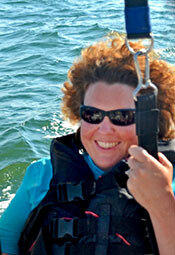 Megean joins IAN as part of the UMCES and MSDE partnership. She is providing science education support for the MADE CLEAR project. She will coordinate the K-12 work group, which provides teacher professional development opportunities that promote climate science integration into curricula. Prior to joining UMCES, she completed her doctoral degree in Science Education Curriculum and Instruction from UMD, College Park. Her research focused on how curriculum development teams worked to infuse technology into science curricula. She also earned a M.S. degree in Environmental Science and Policy from Johns Hopkins University and a B.S. degree in Education from Towson University. When she's not working with educators and climate scientists, Megean enjoys time with her husband, Jon, two active children, and two dogs. She also competes in sprint triathlons.
Megean joins IAN as part of the UMCES and MSDE partnership. She is providing science education support for the MADE CLEAR project. She will coordinate the K-12 work group, which provides teacher professional development opportunities that promote climate science integration into curricula. Prior to joining UMCES, she completed her doctoral degree in Science Education Curriculum and Instruction from UMD, College Park. Her research focused on how curriculum development teams worked to infuse technology into science curricula. She also earned a M.S. degree in Environmental Science and Policy from Johns Hopkins University and a B.S. degree in Education from Towson University. When she's not working with educators and climate scientists, Megean enjoys time with her husband, Jon, two active children, and two dogs. She also competes in sprint triathlons.
Climate Change Impact newsletters
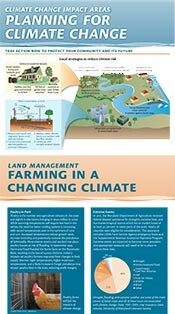 These two newsletters, published in collaboration with the Maryland Department of Natural Resources, provide guidance for dealing with climate change. Changes in Maryland's climate will likely have far-reaching impacts, most notably those associated with rising sea level, increasing temperatures, and changes in precipitation patterns. In order to protect local citizens from public health and safety risks and to protect public and private investments, communities should begin to plan for the impacts of climate change. Communities are encouraged to designate Climate Change Impact Areas at the local level and to develop strategies to avoid or reduce impacts. Policies can also be developed that address one or more specific climate-related impacts. These two newsletters are in a series of newsletters on Climate Change Impact Areas, with several more coming out this summer.
These two newsletters, published in collaboration with the Maryland Department of Natural Resources, provide guidance for dealing with climate change. Changes in Maryland's climate will likely have far-reaching impacts, most notably those associated with rising sea level, increasing temperatures, and changes in precipitation patterns. In order to protect local citizens from public health and safety risks and to protect public and private investments, communities should begin to plan for the impacts of climate change. Communities are encouraged to designate Climate Change Impact Areas at the local level and to develop strategies to avoid or reduce impacts. Policies can also be developed that address one or more specific climate-related impacts. These two newsletters are in a series of newsletters on Climate Change Impact Areas, with several more coming out this summer.
Four new job vacancies announced
The University of Maryland Center for Environmental Science is currently advertising for the following four positions.- Estuarine and Watershed Response Data Analyst
- Maryland-Delaware Climate Change Education, Assessment and Research project manager
- Web Designer
- Web Developer